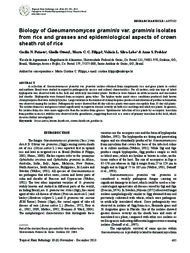Biology of Gaeumannomyces graminis var. graminis isolates from rice and grasses and epidemiological aspects of crown sheath rot of rice.
Biology of Gaeumannomyces graminis var. graminis isolates from rice and grasses and epidemiological aspects of crown sheath rot of rice.
Author(s): PEIXOTO, C. N.; OTTONI, G.; FILIPPI, M. C. C.; SILVA-LOBO, V. L.; PRABHU, A. S.
Summary: A collection of Gaeumannomyces graminis var. graminis isolates obtained from symptomatic rice and grass plants in central and northern Brazil were studied in regard to pathogenicity on rice and cultural characteristics. For all isolates, only one type of lobed hyphopodia was observed both in the field and artificially inoculated plants. Perithecia were formed on artificial media and inoculated leaf sheaths. Hyphopodia were formed from ascosporic germ tubes. The hyphae under moist stress conditions produced dark brown chlamydospores that were initially hyaline. Large variation in the number of chlamydospores produced and duration of perithecia formation was observed among the isolates. Pathogenicity assays showed that 60-day old rice plants were more susceptible than 35-day old plants. The isolates from rice and grasses varied significantly in regard to disease severity on both rice seedlings and adult rice plants. In general, the isolates from rice were more aggressive than the isolates from grasses. Spontaneous infection of rice plants by ascosporic inoculum from perithecia on rice stubbles was observed in the greenhouse, suggesting their role as a source of primary inoculum in the field, which deserves further investigation.
Publication year: 2013
Types of publication: Journal article
Unit: Embrapa Rice & Beans
Keywords: Doença de planta, Fungo, Gaeumannomyces graminis, Oryza sativa
Observation
Some of Embrapa's publications are published as ePub files. To read them, use or download one of the following free software options to your computer or mobile device. Android: Google Play Books; IOS: iBooks; Windows and Linux: Calibre.
Access other publications
Access the Agricultural Research Database (BDPA) to consult Embrapa's full library collection and records.
Visit Embrapa Bookstore to purchase books and other publications sold by Embrapa.

